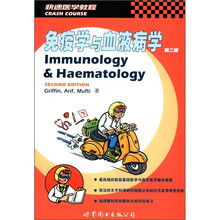Preface
Acknowledgements
Dedication
part Ⅰ:Immunology
1. Principles of Immunity
An overview of immunity
Immunity
The innate immune system
Recognition molecules
Generation of antigen receptor diversity
The adaptive immune system
Humoral immunity
Cell-mediated immunity
2. The Functioning Immune System
Response to tissue damage
Immune response to pathogens
Hypersensitivity mechanisms
Anti-inflammatory drugs
Investigation of immune function Allergy
Autoimmunity
Immune deficiency
Immunization
Transplantation
Part Ⅱ:Haematology
3. Principles of Haematology
Overview of haematology--the cell lines
Haemopoiesis and its regulation
Bone marrow
The spleen
4. Red Blood Cells and Haemoglobin
Structure and function of erythrocytes Erythropoiesis
Iron and haem metabolism
Haemoglobin
The cytoskeleton of the red cell
Metabolism of red cells
Anaemia
Anaemia due to impaired red-cell production
Anaemia due to increased red-cell destruction (haemolytic anaemias)
Anaemia due to blood loss
Polycythaemia (erythrocytosis)
5. White Blood Cells
Structure and function of the white blood cells
Differentiation of white cells
Reactive proliferation of white cells
Neoplastic proliferation of white cells
Leucopenia
6. Haemostasis
Platelets and blood coagulation
Platelet disorders
The coagulation cascade
Clotting factor disorders
Thrombosis
7. Haematological Investigations
Full blood count and reticulocyte count
Differential white count
Peripheral blood film
Investigations of haemoglobinopathies
Bone marrow investigation
Lymph node biopsy
Cytogenetic analysis
ESR and plasma viscosity
Serum electrophoresis
Clotting tests
8. Blood Transfusion
Red-cell antigens
Cross-matching and blood transfusion
Part Ⅲ:Self-assessment
Multiple-choice Questions (MCQs)
Short-answer Questions (SAQs)
Essay Questions
MCQ answers
SAQ answers
Index

 缺书网
缺书网 扫码进群
扫码进群




